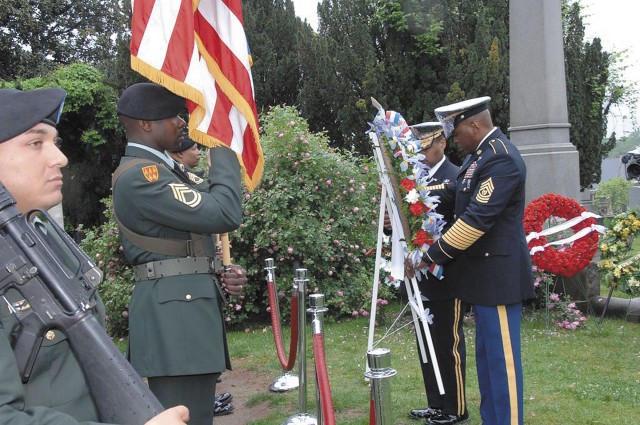
Fort Lee, Va. (May 1, 2008) -- Soldiered in the Continental Army; wounded at the Battle of Trenton.
Served as senator and governor of the state of Virginia.
One of only two presidents who fought in the Revolutionary War.
Held positions as secretary of state and secretary of war simultaneously.
Fifth president of the United States.
James Monroe's accomplishments as a Soldier, statesman and diplomat, varied and numerous, were honored during his 250th birthday commemoration held April 28 at the Hollywood Cemetery in Richmond.
The occasion brought out about 75 people who endured a steady, gentle rain at the 150-year-old historic resting place that straddles the James River.
They included a number of Monroe's descendants, government officials, representatives of historical societies and a contingent from Fort Lee that included a color guard, a 392nd Army Band combo, Chap. (Col.) James Walker and the guest speaker, Brig. Gen. Jesse R. Cross.
Cross, Quartermaster Center and School commanding general, spoke of Monroe's many distinctions during his remarks.
"Throughout his lifetime of achievements, President Monroe was a man of great character," said Cross. "He demonstrated the seven core Army Values that we hold dearly today: loyalty, duty, respect, selfless service, honor, integrity and personal courage."
Cross went on to laud Monroe's selfless service, arguably his more enduring legacy.
"Such was the strength and character of this person - his dedication to duty, his willingness to sacrifice, and his deep and abiding love for his country - that he was never fully paid for his public service. As a result, he had to finance much of his personal travel himself."
When Cross completed his speech, he and his enlisted advisor, Command Sergeant Maj. Nathan Hunt, placed a wreath in front of Monroe's stone tomb, enclosed by a black cast-iron fence.
Monroe died on July 4, 1831 in New York City.
His remains were moved to Hollywood in 1858 and lie just a few feet from the grave of President John Tyler.
In life, Monroe served 50 years of public service. That journey began when the William and Mary graduate volunteered for the Continental Army, then took on positions of greater responsibility and authority that included service in the Virginia House of Delegates, governor of Virginia, minister to France and secretary of State. Monroe was also a chief negotiator during the Louisiana Purchase of 1803.
Though Monroe achieved much before and during his presidency, one of his crowning achievements, the Monroe Doctrine, received more recognition long after he died. The Monroe Doctrine expressed the president's insistence that European colonial powers such as England and Spain refrain from further colonization and interference in the Americas.
Violations of this policy were considered hostile acts by the document. The term was first used in 1836 and has been invoked many times since to include during the Cold War.
The remainder of the ceremony included several wreath presentations from the James Monroe Memorial Foundation and groups such as the Daughters of the American Revolution and Sons of the American Revolution.
Monroe was also honored at his namesake, Fort Monroe, later in the day.

Social Sharing